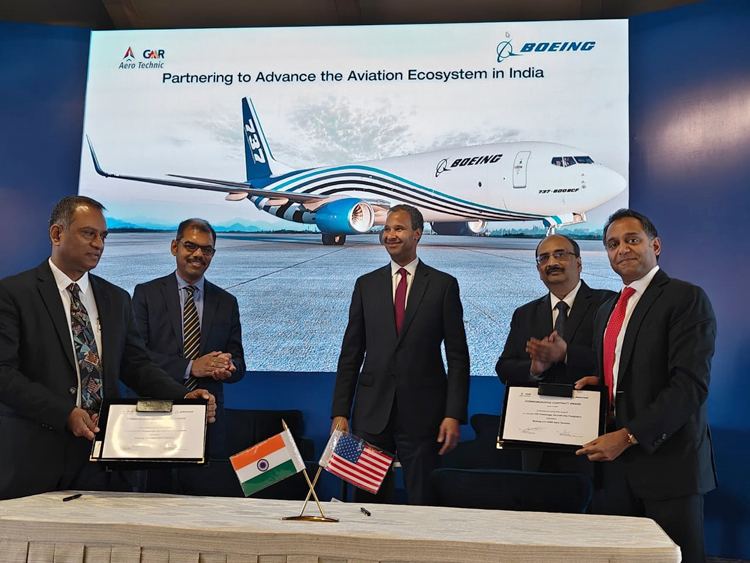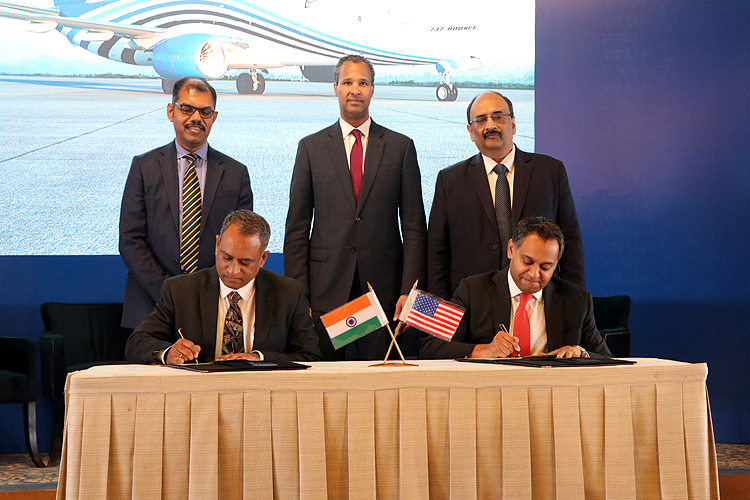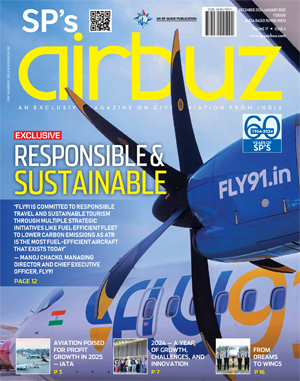"It's not just a bet on cargo or on GMR capability, it's a bet on India": Salil Gupte, President, Boeing India
Boeing and GMR Aero Technic to Set Up India's first Boeing Converted Freighter line in Hyderabad

GMR Aero Technic is the first Boeing supplier in India that will have the capability to support future conversions of both domestic and foreign aircraft. Boeing, on March 10, 2023, announced an agreement with GMR Aero Technic to establish a new Boeing Converted Freighter (BCF) line in Hyderabad. Boeing’s Chief Strategy Officer Marc Allen stated that the facility will add to Boeing's $1 billion supply chain sourcing from India and will help support India's ambitions to become a global cargo hub. With this facility, Boeing’s goal is to service the region, not just India, rather India and beyond.
The collaboration adds to Boeing’s continued investments to support the growth of cargo and help expand complex aircraft modification capabilities and Maintenance, Repair and Overhaul (MRO) in India, supporting India’s aspiration to become an aviation, aerospace and an MRO hub for the region.
“Our cooperation with GMR Aero Technic not only a testimony of the maturation of Indian MROs in the country to support the vision of Atmanirbhar Bharat, but also supports the anticipated growth of the cargo sector in the region,” said Salil Gupte, President, Boeing India.
“The facility will add to Boeing's $1 billion supply chain sourcing from India,” Boeing’s Chief Strategy Officer Marc Allen stated.
According to Boeing’s Commercial Market Outlook, India’s air cargo growth is expected to average 6.3 per cent annually, driven by the country’s manufacturing and e-commerce sectors, including its Make in India initiative. Boeing forecasts demand for more than 75 freighters, including production and converted freighters. India’s domestic strength has a massive untapped potential with only 15 freighter aircraft today.
Gupte also mentioned that 1,720 freighters are expected for the next 20 years. About 20 per cent of those will be in Europe, about 30 per cent of those will be in America, and about 50 per cent will be in Asia and Middle East Africa regions. He added that he believes there's a substantial opportunity for India to get a very large share of those.
“We know that within India, there are several carriers that have already taken up freighter conversions, and so we know that there's going to be demand. There is a significant opportunity for companies that are involved in the manufacturing or for companies that are involved in the purchasing of those goods to shorten the time, to shorten the supply chain, to reduce the inventory that they have in process by leveraging air cargo as opposed to all the modes of transportation. And as India gets into those higher value elements of the manufacturing, it fits hand in glove with having more air cargo. That's really what the bet is. And so, you know, when you make a bet like this, it's not just a bet on cargo or on GMR capability, it's a bet on India because it's a bet that India will continue to grow that manufacturing ability to drive that entire life,” added Gupte.
According to Boeing’s Commercial Market Outlook, India’s air cargo growth is expected to average 6.3 per cent annually, driven by the country’s manufacturing and e-commerce sectors, including its Make in India initiative.
Neither the exact volume nor the exact date for the beginning of the BCF line is clear yet. However, Boeing plans to immediately begin the technology transfer and the transfer in terms of capability, to be carried over the next 18 months. Boeing is in talks with every single major airline customer and some airlines, some startups as well that want to enter the cargo space in India because they see the growth potential of the market.
Speaking on this agreement, Ashok Gopinath, CEO, GMR Aero Technic said, “With the rise in the Indian aviation industry, MRO services in India has been one of the fastest- growing markets globally. The collaboration with Boeing reaffirms our capability to provide world-class MRO services and further contribute to the “Make in India” initiative. We thank Boeing for the opportunity given and look forward to working together for future initiatives.”

Standing (From Left to Right) Pradeep Panicker, CEO – GHIAL & Board of Director for GMR Aero Technic; Marc Allen, chief strategy officer, The Boeing Company; Ashwani Bhargava, senior director supply chain, Boeing India.
Boeing has more than 40 years of successful experience in passenger-to-freighter conversions, relying on original design data and a deep understanding of the needs of the air cargo industry to deliver a superior, integrated product. In its commercial outlook, the manufacturer stated that Boeing Freighters had more than 90 per cent market share. In 2022, Boeing freighters witnessed a strong demand with 131 orders.
Gupte also highlighted, “No one has accelerated and built the scale of the engineering capability that we have built here in the short period of time, at least in the aerospace field amongst any of the Original Equipment Manufacturers (OEMs); and in manufacturing, no one has more exports from India above us. We are the leader in that as well and we will continue to be the leader no matter what anyone else puts up. The leadership in cargo overall has also bled over into our leadership in freighter conversions in this particular business as well.”
Boeing plans to immediately begin the technology transfer and the transfer in terms of capability, to be carried over the next 18 months.
India’s long-term forecasted growth in air traffic, and availability of a large pool of skilled aviation technicians and engineers, position it well to become a key regional player in the commercial aviation sector. India’s strong human resource and industry capital also serve to be significant advantages.
With over eight decades of presence in India, Boeing has built a strong network of support for its customers in the region through various initiatives and partnerships while contributing to the growth and development of the Indian aerospace and defence sector.
On the sidelines of the announcement, Jayant Baranwal, Editor-in-Chief, SP's AirBuz had a quick chat with Boeing India President, Salil Gupte. Excerpts from the conversation:
Jayant Baranwal (JB): What kind of split is there between Boeing and GMR on this project?
Salil Gupte (Gupte): Well, they are to partner with us contractually. So the way it works is, for everything we have arrived at an economic agreement per conversion that has to be done.
JB: Even though the capacity number isn’t announced yet, is it going to be a used aircraft for the freighter conversion line?
Gupte: So the way it works is you have a midlife asset so it is a used aircraft, always, for freighter conversion. It's usually about halfway through its usable life traditionally, and the aircraft can be owned by anyone. Sometimes they are even owned by leasing companies; sometimes by airlines, sometimes it's cargo companies themselves. So it's all of the above really in terms of potential customer types.
JB: Can you elaborate industrial capital please? You talked about India’s strong industrial capital, do you mean India is rich in terms of supply chain capability?
Gupte: Yes, so industrial capital is your supply base and that is one of the things that has evolved so greatly over the last decade. It is in manufacturing where we have gone from simple assemblies, simple electrical work to more complex electrical work, more complex components to large scale air structures like Mark Allen mentioned the Apache fuselage, the 737 to next generation manufacturing technologies like full scale determining assembly to working with complex composites, like the 787 floor beams. And then of course, there's the MRO capability that Ashok and others in the industry have come up with over the course of over a decade, but has really started to accelerate since the government made its decision to rationalise taxation on MRO a couple of years ago and that will allow India to grow in that space.
JB: But we are still far from the overall integration of the commercial aircraft. Can India produce or deliver the Boeing and Airbus in the country itself?
Gupte: It's not clear to me whether that is how you should judge India's progress because the final assembly of an aircraft, whether it's a defence or commercial, matters, but it's less than 10 per cent of the value of the airplane. So it's not a significant number. So to me, that's not how you judge the progress of the supply chain.How you judge the progress of the supply chain is the maturity of the complexity of what it can do. And in that India has been accelerating at a very impressive rate over the last decade, both in manufacturing and in services.
JB: Some companies around the world are coming up with unmanned systems as well for the cargo solution, is Boeing also looking at that?
Gupte: This is a traditional technology in terms of leveraging used aircraft like the 737 NG, 737-800 aircraft and we're taking that into the freighter conversion realm and we've been doing so. We had our 100th delivery of this aircraft last September. So it's a tried, proven platform and it's for a certain amount of cargo space. The unmanned solutions that you are referring to are very small, they are last mile delivery and there's a number of companies around the world that are evaluating large scale drones for leveraging that delivery. Certainly, Boeing has its own autonomous technology but right now we are focusing on passengers there. Certainly, there are opportunities beyond that in the future but that's a completely different class.





